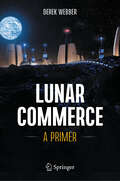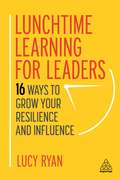- Table View
- List View
Lufa Farms
by Annelena Lobb Jose B. Alvarez Robert MackalskiIn 2013, Mohamed Hage, founder of the rooftop farming business called Lufa Farms, thought his company had reached a level of maturity where scaling the business model was the next logical step. With two greenhouses already in Canada, he was looking into other locations in the U.S. Though Lufa Farms' advanced cultivation technologies made the company stand out in its sector, the industry was still young and investors were not fully comfortable putting their resources into rooftop farms. This case explores the intricacies of a rooftop farming business, how it built a successful brand, and presents the challenges that might lie ahead for the company as the founder thinks about expansion.
Lufax: FinTech and the Transformation of Wealth Management in China
by Lauren H. Cohen Christopher Malloy Anthony K. WooThis case examines the rise and competitive positioning of Lufax, an online marketplace headquartered in Shanghai, China, and a pioneer in the origination and trading of financial assets. The company had grown at a remarkable rate, and was awarded “Trading Platform of the Year” for 2017 by the Asian Banker Financial Markets Awards Programme. Case protagonist Gregory Gibb, Chairman & CEO of Lufax, must decide how to navigate the challenging regulatory and competitive landscape, in order to achieve Lufax’s goal of transforming and expanding the wealth management industry in China. Whether the technology giants (e.g. Baidu, Alibaba, and Tencent, often collectively known as “BAT”) would be able to develop strong capabilities in the “Fin” part of “FinTech,” and whether traditional financial institutions would become technologically sophisticated enough for their “Tech” capabilities to materialize, were among some of the key uncertainties and potential challenges that Lufax had to confront. There were also looming risks and lingering uncertainties on the political and regulatory front. The focal point of the case centers around how Gibb can strategize and position Lufax going forward, and leverage its unique “finance DNA” to try to win market share in the rapidly changing FinTech and wealth management sectors in mainland China.
Luftbildeinsatz in der ländlichen Bodenordnung: Ein Praxisbeispiel aus Rheinland-Pfalz (essentials)
by Martin Schumann Thomas MitschangIn diesem essential beschreiben Martin Schumann und Thomas Mitschang die Verwendung von Luftbildern in der Flurbereinigungsverwaltung Rheinland-Pfalz. Anhand eines Beispiels stellen die Autoren die Bedeutung der Luftbilder für die Planung von Landentwicklungsmaßnahmen dar. Seit den fünfziger Jahren des letzten Jahrhunderts werden Luftbilder für die unterschiedlichen Zwecke eingesetzt. Dabei haben sich die Qualität der Aufnahmen sowie die Auswertungsmöglichkeiten im Laufe der Jahrzehnte verändert.
Luftfracht: Akteure – Prozesse – Märkte - Entwicklungen
by Joachim G. SchäferDieses Buch beschreibt anhand zahlreicher Beispiele die gegenwärtigen Chancen und Risiken der Luftfracht vor dem Hintergrund stagnierender Transportmengen seit der Finanzkrise im Jahr 2008. Es zeigt, welche Auswirkungen diese Entwicklungen auf die Beteiligten haben, insbesondere auf Versender, Fluggesellschaften, Flughäfen und Spediteure. Die anwendungsorientierte Darstellung ermöglicht zudem einen Einblick in die Gestaltung komplexer Lieferketten und die Spannungsfelder, in denen sich die Akteure der Luftfracht bewegen.
Luigi Amoroso: The Building of Economics Between Science and Ideology (Palgrave Studies in the History of Economic Thought)
by Mario PominiThis book outlines the rich and complex path of Luigi Amoroso, the main exponent of the Paretian School in Italy and probably the most important Italian mathematical economist during the interwar period. The author presents, in a systematic form, the evolution of Amoros's thinking and his main achievements. Despite his relevance, many aspects of Amoroso's thought are little known or misunderstood. This volume delves further to explore the Paretian tradition in which Amoroso enlisted, the conservative anti-democratic ideology that prompted his adhesion to fascism, his contribution to defining the main features of economic theory as formal science, and his various contributions to specific fields such as microeconomic theory, equilibrium dynamics, business cycles and non-competitive markets. It will be relevant to students and researchers interested in the history of economic thought.
Luigi Einaudi: Selected Economic Essays, Volume 2
by Riccardo Faucci Roberto Marchionatti Fondazione Luigi Einaudi TorinoLuigi Einaudi (1874-1961) was a leading liberal Italian economist, economic historian and political figure: Governor of the Bank of Italy, Minister for the Budget and President of the Italian Republic. He was a prolific writer in all fields and his writings testify to his outstanding contribution to economics during his long career.
Luigi Einaudi: Selected Political Essays, Volume 3
by Domenico Da Empoli Corrado Malandrino Valerio Zanone Fondazione Luigi Einaudi RomaLuigi Einaudi (1874-1961) was a leading liberal Italian economist, economic historian and political figure: Governor of the Bank of Italy, Minister for the Budget and President of the Italian Republic. He was a prolific writer in all fields and his writings testify to his outstanding contribution to economics during his long career.
Luigi L. Pasinetti: Leading Scholar And System Builder Of The Cambridge School Of Economics (Palgrave Studies In The History Of Economic Thought)
by Mauro L. Baranzini Amalia MiranteLuigi L. Pasinetti (born 1930) is arguably the most influential of the second generation of the Cambridge Keynesian School of Economics, both because of his achievements and his early involvement with the direct pupils of John Maynard Keynes. This comprehensive intellectual biography traces his research from his early groundbreaking contribution in the field of structural economic dynamics to the ‘Pasinetti Theorem’. With scientific outputs spanning more than six decades (1955–2017), Baranzini and Mirante analyse the impact of his research work and roles at Cambridge, the Catholic University of Milan and at the new University of Lugano. Pasinetti’s whole scientific life has been driven by the desire to provide new frameworks to explain the mechanisms of modern economic systems, and this book assesses how far this has been achieved.
Luke Fuszard
by Leslie A. Perlow Matthew PrebleLuke Fuszard (MBA 2010) shares the personal details of his life leading up to the moment when he was unexpectedly fired from his job in early 2021.
Lukens Inc.: The Melters' Committee (A)
by Jay W. Lorsch Alison H. WatsonDiscusses the Lukens board's involvement in strategic planning.
Lululemon and the Future of Technical Apparel
by Chip WilsonThe unauthorized story of Lululemon.This is a book about ordinary people who took an opportunity to be creative, to be innovative, and to maximize their potential. Chip Wilson&’s part in this story comes from the learning of thousands of mistakes. He set the culture, business model, quality platform, and people development program and then got out of the way. Lululemon&’s exponential growth, culture, and brand strength have few peers, and it is because of those employees who choose to be great. This book is also about missed opportunity - five years of missed opportunity. Chip was playing to win while the directors of the company he founded were playing not to lose.
Lumen and Absorb Teams at Crutchfield Chemical Engineering
by Teresa M. Amabile Elizabeth A. SchatzelLarge discrepancies have developed between two elite technology development teams at Crutchfield Chemical Engineering in terms of motivation and creativity. To investigate, Paul Burke, director of corporate technology development, commissioned a study of the day-by-day dynamics within these teams (the Lumen and Absorb teams). Using 10 days' worth of electronic daily diaries collected from all members of the two teams, the study reveals rich information about team leader behaviors, team member thoughts and behaviors, team dynamics, and project progress. By summarizing both the diary data and personality data on both teams' members, the study presents Burke with a clear dilemma about enhancing and maintaining motivation and creativity in teams of high-level professionals working on challenging projects under difficult organizational conditions.
Luminopia: Improving Treatment for Visual Disorders
by Doug J. Chung Sarah MehtaLuminopia-a start-up founded in January 2016 by three Harvard College freshmen-uses virtual reality technology to treat amblyopia (more commonly called "lazy eye"), the single biggest cause of visual disorders among children. By February 2017, the three founders had raised $950,000 in angel funding and developed a prototype of their virtual reality product, which was in use in clinical trials at Boston Children's Hospital. As the founders prepare to bring their new medical device to market, they struggle with two key decisions: Should Luminopia create its own salesforce to sell its product or should it outsource? And how should the company price its device to maximize returns yet remain attractive to doctors, insurance providers, and individual patients?
Luna Pen (A)
by Kathleen L. Mcginn Michael A. WheelerDiscusses the negotiation of a possible trademark infringement involving a German conglomerate and a Taiwanese trading firm.
Luna Pen (B)
by Kathleen L. Mcginn Michael A. WheelerPresents a series of multiple choice options to be distributed and discussed in class.
Lunar Commerce: A Primer
by Derek WebberThis book explores the advent of lunar commerce including the potential scale and timing of the initiative, the associated revenue potential and the potential risks and uncertainties. Specifically, it discusses the reason for the increased interest in lunar commerce, which lunar markets will be part of the initiative and how much of it will be commercial or dependent on government funding. It provides an easy introduction to the content of the Lunar Commerce Portfolio, which was recently issued, under the author's leadership, by the Working Group on Lunar Commerce and Economics of the Moon Village Association, which has Observer Status at the United Nations in Vienna.
Lunch with the FT: A Second Helping
by Lionel BarberLunch with the FT has been a permanent fixture in the Financial Times for almost 30 years, featuring presidents, film stars, musical icons and business leaders from around the world.The column is now a well-established institution, which has reinvigorated the art of conversation in the convivial, intimate environment of a long and boozy lunch.This new and updated edition includes lunches with:Elon MuskDonald TrumpHilary MantelRichard BransonZadie SmithNigel FarageRussell BrandDavid GuettaYanis VaroufakisJean-Claude JunckerGwyneth PaltrowRebecca SolnitJordan PetersonChimamanda Ngozi AdichieAnd more...
Lunch-Bucket Lives: Remaking the Workers’ City
by Craig HeronLunch-Bucket Lives takes the reader on a bumpy ride through the history of Hamilton’s working people from the 1890s to the 1930s. It ambles along city streets, peers through kitchen doors and factory windows, marches up the steps of churches and fraternal halls, slips into saloons and dance halls, pauses to hear political speeches, and, above all, listens for the stories of men, women, youths, and children from families where people relied mainly on wages to survive. Heron takes wage-earning as a central element in working-class life, but also looks beyond the workplace into the households and neighbourhoods—settlement patterns and housing, marriage, child care, domestic labour, public health, schooling, charity and social work, popular culture, gender identities, ethnicity and ethnic conflict, and politics in various forms—presenting a comprehensive view of working-class life in the first half of the twentieth century. This book has been published with the help of a grant from the Federation for the Humanities and Social Sciences, through the Awards to Scholarly Publications Program, using funds provided by the Social Sciences and Humanities Research Council of Canada.
Lunchclub: Algorithmic Networking
by Scott Duke Kominers George GonzalezAlgorithmic networking startup Lunchclub coordinates in-person meetings between professionals who would have been unlikely to meet. The company faces marketplace design, growth, and monetization challenges: The executive team has to refine Lunchclub's marketplace strategy, and determine whether the company should continue to focus on its current use cases and geographical hubs or expand the platform's scale and scope. And while Lunchclub unlocks significant value by brokering new connections, the team still has to identify whom to charge and how.
Lunchtime Learning for Leaders: 16 Ways to Grow Your Resilience and Influence
by Lucy RyanYou've got a rare empty slot in your diary today, squeezed between meetings, phone calls and dealing with the incessant incoming emails. You can grab a sandwich, power through and run yourself down, or you can STOP. You can pick up this book, choose a chapter that inspires you and learn something new. This isn't a time for standing still; developing and growing as a leader is imperative if you want your team and company to be successful. Lunchtime Learning for Leaders is an actionable guide to everything you need to know to be a successful leader. Each chapter is a short-burst overview of a key leadership challenge thousands of leaders before you have faced and successfully tackled with the help of the author Lucy Ryan. And all of them can be mastered in under an hour! From leading your team through change, adapting your leadership style to the task at hand, gathering influence to building resilience, this book is your essential guide to becoming the best leader you can be. Dedicate just a few hours and invest in Lunchtime Learning for Leaders. You will reap the benefits and come out better prepared for whatever comes next on your business leadership journey.
Luotang Power: Variances Explained
by Robert L. Simons Craig J ChapmanThe general manager of Luotang Power, a coal-fired power plant located in central China, reviews annual results before a meeting with the board of directors. He thought the company performed well during the year and both plant availability and fuel economy had improved over the previous year. However, the positive performance does not show in the financial results and he must investigate before presenting to the board. He considers performing a variance analysis to better understand plant performance compared to the previous year. He also examines the contractual arrangement the plant has with the provincial power company for a minimum purchase of electricity to supplement regional demand. The company had been successful at selling excess electricity to the power plant but over the past 12 months, demand has decreased. Students must complete a quantitative analysis of the plant's performance and prepare recommendations to improve reporting and evaluation of the plant's performance. This case can be used in an introductory managerial accounting course to explore variance analysis and incentives in contracts.
Lure of Global Branding
by David A. Aaker Erich JoachimsthalerAs more and more companies begin to see the world as their market, brand builders look with envy upon those businesses that appear to have created global brands--brands whose positioning, advertising strategy, personality, look, and feel are in most respects the same from one country to another. Attracted by such high-profile examples of success, these companies want to globalize their own brands. But that's a risky path to follow, according to David Aaker and Erich Joachimsthaler. Why? Because creating strong global brands takes global brand leadership. It can't be done simply by edict from on high. Specifically, companies must use organizational structures, processes, and cultures to allocate brand-building resources globally, to create global synergies, and to develop a global brand strategy that coordinates and leverages country brand strategies. Aaker and Joachimsthaler offer four prescriptions for companies seeking to achieve global brand leadership. First, companies must stimulate the sharing of insights and best practices across countries--a system in which "it won't work here" attitudes can be overcome. Second, companies should support a common global brand-planning process, one that is consistent across markets and products. Third, they should assign global managerial responsibility for brands in order to create cross-country synergies and to fight local bias. And fourth, they need to execute brilliant brand-building strategies. Before stampeding blindly toward global branding, companies need to think through the systems they have in place. Otherwise, any success they achieve is likely to be random--and that's a fail-safe recipe for mediocrity.
Lured by the American Dream: Filipino Servants in the U.S. Navy and Coast Guard, 1952-1970 (Asian American Experience)
by P. James PaligutanStarting in 1952, the United States Navy and Coast Guard actively recruited Filipino men to serve as stewards--domestic servants for officers. Oral histories and detailed archival research inform P. James Paligutan's story of the critical role played by Filipino sailors in putting an end to race-based military policies. Constrained by systemic exploitation, Filipino stewards responded with direct complaints to flag officers and chaplains, rating transfer requests that flooded the bureaucracy, and refusals to work. Their actions had a decisive impact on seagoing military’s elimination of the antiquated steward position. Paligutan looks at these Filipino sailors as agents of change while examining the military system through the lens of white supremacy, racist perceptions of Asian males, and the motives of Filipinos who joined the armed forces of the power that had colonized their nation. Insightful and dramatic, Lured by the American Dream is the untold story of how Filipino servicepersons overcame tradition and hierarchy in their quest for dignity.












